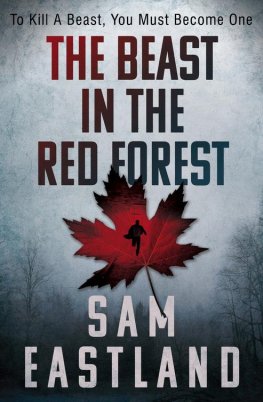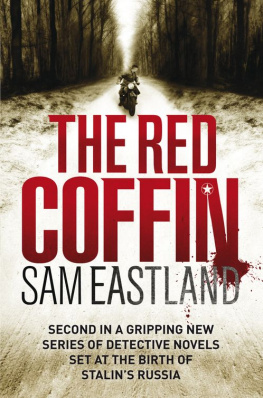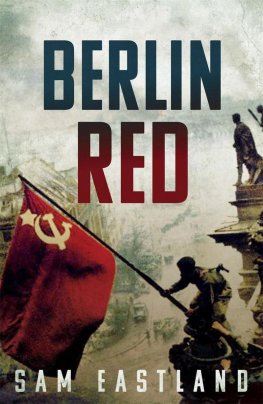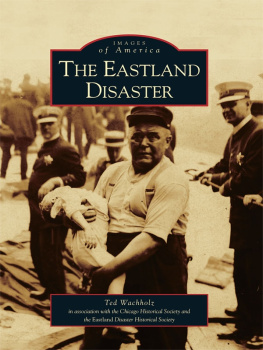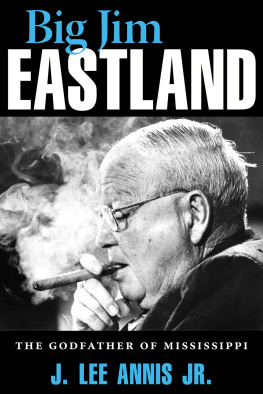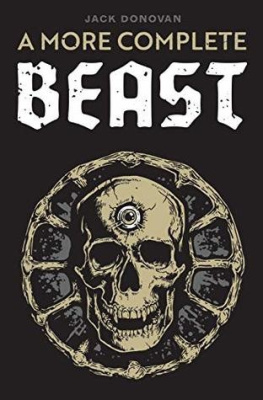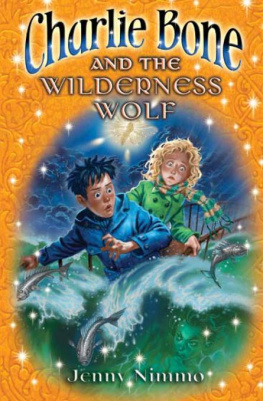Sam Eastland - The Beast in the Red Forest
Here you can read online Sam Eastland - The Beast in the Red Forest full text of the book (entire story) in english for free. Download pdf and epub, get meaning, cover and reviews about this ebook. year: 2013, publisher: Faber & Faber, genre: Detective and thriller. Description of the work, (preface) as well as reviews are available. Best literature library LitArk.com created for fans of good reading and offers a wide selection of genres:
Romance novel
Science fiction
Adventure
Detective
Science
History
Home and family
Prose
Art
Politics
Computer
Non-fiction
Religion
Business
Children
Humor
Choose a favorite category and find really read worthwhile books. Enjoy immersion in the world of imagination, feel the emotions of the characters or learn something new for yourself, make an fascinating discovery.
- Book:The Beast in the Red Forest
- Author:
- Publisher:Faber & Faber
- Genre:
- Year:2013
- ISBN:9780571281466
- Rating:5 / 5
- Favourites:Add to favourites
- Your mark:
- 100
- 1
- 2
- 3
- 4
- 5
The Beast in the Red Forest: summary, description and annotation
We offer to read an annotation, description, summary or preface (depends on what the author of the book "The Beast in the Red Forest" wrote himself). If you haven't found the necessary information about the book — write in the comments, we will try to find it.
The Beast in the Red Forest — read online for free the complete book (whole text) full work
Below is the text of the book, divided by pages. System saving the place of the last page read, allows you to conveniently read the book "The Beast in the Red Forest" online for free, without having to search again every time where you left off. Put a bookmark, and you can go to the page where you finished reading at any time.
Font size:
Interval:
Bookmark:
Sam Eastland
The Beast in the Red Forest
(Postmark: Elizabeth, New Jersey. March 4th, 1936.)
(Return Address: none)
To:
The United Brotherhood of Steelworkers, Branch 11,
Jackson St,
Newark, New Jersey, USA
Boys, I am leaving today!
My bags are packed and Im bound for a new life in Russia. I have a guarantee of work, housing and school for my two kids as soon as I walk off the boat. They are practically begging for skilled craftsmen over there, while here in America there are over 13 million unemployed. As you know, there are members of our New York City Chapter currently living with their families in abandoned buildings down on Wall Street. We are fighting each other for handouts at the bread lines. Last month, I sold, for the price of one dollar, all the medals I won fighting in the Argonne Forest back in the Great War.
Come to Russia, boys. Thats where the future is. I realise that leaving home is hard, and starting a new life is even harder, but I know you are as tired as I am of being chewed up and spat out and begging for what we know is ours by right. Arent you sick of staying up late nights and worrying if you will make the rent this month, or else be thrown out into the street?
The Soviet Trade Agency has an office in Manhattan. Each step of the way, they help those who are searching for a new beginning. Thousands of Americans are arriving in Russia every day and they are being welcomed with open arms. They dont care if you are black or white, as long as youre ready to work. Moscow has its own English-language schools, an English-language newspaper, and even has a baseball team!
I hope I will see you all again soon in the great new country Mr Joseph Stalin is building, with the help of men and women just like you and me.
Yours sincerely,
William H. Vasko
Western Ukraine
February 1944
Captain Gregor Hudzik remarked to himself, as his shovel chipped through the frozen ground, how many of the skeletons still had rosary beads entwined about their wrists.
South of the town of Tsuman, in western Ukraine, on a dirt road between the villages of Olyka and Dolgoshei, lay the ruins of a place called Misovichi. Its population had never been more than a few hundred. They were farmers, tanners of leather and brewers of rough alcohol, known as samahonka, which had achieved some notoriety in the region. Their unremarkable but steady way of life changed forever when, in late 1918, a soldier named Kolya Yankevitch returned to Misovichi after serving in the army of the Tsar. Soon after reaching home, Yankevitch fell ill with the Spanish influenza virus which, in the years immediately following the conflict, killed more people than the Great War itself had done. The virus spread through the town. Few were spared. The dead were buried in the woods, in mass graves dug by men and women who were themselves soon laid to rest in those same pits.
By the time the epidemic had run its course, disappearing as suddenly as it had arrived, there was no one left in the village of Misovichi.
Fearing that the disease might still be lurking in the beds of those who had perished, in their faded portraits on the walls and in the drawers of battered cutlery, the houses and their contents were left to rot. Whole shelves of books, their pages bloated with the damp and covers powdered green with mildew, remained abandoned. Floorboards buckled. Ceilings sagged and then collapsed, spilling beehives choked with honey and wooden chests containing baptismal cups, confirmation documents and wedding dresses into the rooms below. The streets and alleyways of Misovichi became rivers of wildflowers.
No one spoke of the town any more, as if the place had been washed from the memories of everyone who lived in the nearby villages of Borbin, Milostov and Klevan.
Almost everyone.
A local man named Gregor Hudzik had been thinking about the people of Misovichi, and the mass grave in the forest where they had all been laid to rest.
Hudzik was a farrier by trade. At one time, his business had made him one of the wealthier men in Borbin. He had travelled from town to town, as far away as Rovno and Lutsk, with an anvil, bellows, tongs and hammers on his cart. But there was more to being a farrier than simply shoeing horses all day long. He had to be a listener as well. People talk to a man who only comes by once a month in ways they never would if they saw him every day. Patiently, he listened to their fears and hopes and disappointments. Lovers and mistresses. Lies and betrayals. No detail was ever too small that someone did not choose to let him know. In silence, Hudzik endured their stories of self-pitying vanity, which was how he came to know that a good portion of the wealth of Misovichi lay glimmering in the jaws of its inhabitants.
By the time the war broke out in 39, Hudzik had been shoeing horses for over twenty years. At first, he imagined that his work prospects might even improve, but one day in the summer of 1941, he was stopped on the road by a column of Red Army soldiers as they retreated from the invading German army. They moved in a rabble of barely functioning trucks, spent horses towing overloaded wagons and men shambling along barefoot, their poorly made boots having long ago fallen apart.
They promptly confiscated his wagon, his horses and all of his supplies. They even took his shoes away from him.
When Hudzik, sobbing with impotent rage, asked what he should do now with his life, the leader of the column offered to bring him along. Or else, Hudzik was told, he could take his chances with the German army, who were, by then, only a few kilometres down the road.
Realising the true nature of his predicament, Hudzik agreed. His shoes were returned to him, along with his horse and his cart, now loaded down with wounded soldiers, and he joined the retreating Red Army.
Arriving in Kiev one week later, Hudzik was formally enlisted as a farrier in the Red Army. He was given a uniform and the rank of sergeant.
At first, it had all seemed like a cruel joke to Hudzik but, in time, he came to understand that this twist of fate had probably saved his life.
Both of his horses died in the winter of that year. The first stepped on a Russian landmine when it slipped its tether one night and wandered out into a field. The second froze to death in the town of Pozhaists and was immediately hacked to pieces for food. The cart wore out in the spring of 1942. With iron-rimmed wheels yawing on their axles, it finally collapsed beneath the weight of a thousand horseshoes which Hudzik was transporting from a foundry to a supply depot.
As he stared at the ruin of his cart, and the tangled heap of horseshoes strewn across the road, it seemed to Hudzik that the last link to his home had finally been severed.
Taking it as a sign that he would never get back there alive, Hudzik sat down by the side of the road, put his head in his hands and wept.
This event was witnessed by a famous journalist, Vasily Semyonovich Grossman, who wrote a story about it for the Red Army newspaper, Krasnaya Zvezda. In the article, Grossman transformed the shambles of Hudziks wagon wreck into a symbol of the Red Armys heroic struggle. They even took Hudziks picture, which showed a luckless creature, formed of mud and soot, with matted hair and staring eyes and the paths of tears like war paint daubed across his cheeks.
If it hadnt been for that photograph, Hudziks grim prediction might well have come true. But in the halls of the Kremlin, his battle-weary face did not go unnoticed.
Soon afterwards, Hudzik received a medal, promotion to the rank of captain and orders of transfer to the Headquarters staff. From then on, he was no longer a driver of carts and a shoer of horses in the front line. That job passed to other men, who went on to die in great numbers, their mildewed bones lying jumbled with those of the horses who perished alongside them, unburied on the Russian steppe.
Font size:
Interval:
Bookmark:
Similar books «The Beast in the Red Forest»
Look at similar books to The Beast in the Red Forest. We have selected literature similar in name and meaning in the hope of providing readers with more options to find new, interesting, not yet read works.
Discussion, reviews of the book The Beast in the Red Forest and just readers' own opinions. Leave your comments, write what you think about the work, its meaning or the main characters. Specify what exactly you liked and what you didn't like, and why you think so.

